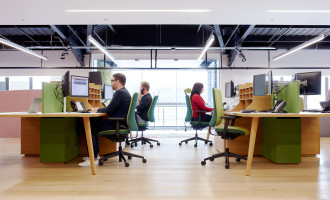Long-term musculoskeletal (MSK) claims are one of the most significant health and financial challenges facing UK businesses today, particularly for large organisations managing office-based teams. The issue goes far beyond offering employees comfortable seating for the short term. It requires the creation of workspaces that actively prevent injury and illness well into the future. For facilities managers and decision-makers, the responsibility is to future-proof office environments, and smart ergonomic chairs are one of the strongest tools available to achieve that.
Why Future-Proofing Matters: The Ongoing Cost of MSK Claims
Musculoskeletal disorders remain the leading cause of work-related illness in the UK. Preventable neck, shoulder, and back injuries regularly lead to time off work, reduced productivity, and in many cases, costly long-term claims that affect financial stability. The HSE shows these claims impact hundreds of thousands of workers each year and cost employers millions in lost time and settlements. For companies with 200 employees or more, the likelihood and impact of such issues increase significantly.
The financial implications include direct costs such as legal settlements, statutory sick pay, and the need to provide cover for absent staff. There are also indirect consequences including reduced productivity, increased insurance premiums, and challenges with staff retention. A high rate of injury-related claims can also damage a company’s reputation in a competitive recruitment landscape.
While it may be tempting to focus solely on meeting minimum compliance standards, true future-proofing requires going further. Strategic ergonomic investment helps reduce claims, protects your workforce, and supports sustainable growth.
Understanding the Link Between Poor Seating and Long-Term MSK Issues
Many UK employees spend more than seven hours a day sitting at their desks. When a chair does not fit the user’s body, the risks accumulate quickly. Poor lumbar support contributes to lower back pain and spinal problems. Chairs with fixed positions increase muscle fatigue and repetitive strain injuries. Non-adjustable seating leaves both tall and petite employees without adequate support, which increases discomfort and the likelihood of long-term damage.
What Makes a Chair Truly “Smart” in Ergonomic Terms?
A smart ergonomic chair offers far more than comfort or attractive design. It promotes healthy posture, encourages movement throughout the day, and adapts to the individual needs of each user. The most effective chairs offer several adjustment points such as seat height, lumbar depth, tilt tension, and armrest positioning. Many also come with bespoke options that allow companies to tailor models to different physical requirements or job roles, including headrests or bariatric support.
A smart chair is not a one-size-fits-all solution. It is a flexible, adaptive tool that supports a diverse and evolving workforce.
A Strategic Approach to Reducing Risk
At Posture People, we see future-proofing as a process that combines assessment, equipment, training, and ongoing support. A successful strategy begins with comprehensive workstation assessments. Before choosing new equipment, it is essential to understand your current setup. Many employees do not know how to use the chairs they already have. Tailored DSE assessments help identify risks and highlight areas that need improvement.
Choosing the right chairs comes next. The best ergonomic chairs are those that support the user not only today but over many years.
Training is equally important. Even the best chair will not help if staff use it incorrectly. One-to-one support and setup guidance ensure employees understand how to adjust their equipment. In many cases, MSK symptoms improve simply because people learn to sit and work more effectively.
Finally, scheduled reviews and proactive aftercare help maintain a healthy working environment. Teams evolve, people move roles, and physical needs change over time. Annual ergonomic reviews help you respond early to emerging risks, preventing them from turning into long-term claims.
How Facilities Managers Benefit from Smart Ergonomics
For those responsible for large or distributed teams, seemingly small issues can quickly escalate. A future-focused ergonomic approach provides tangible advantages. Absenteeism typically falls when MSK injuries are reduced, which supports consistent productivity. Staff who feel well supported tend to stay longer, which strengthens morale and helps businesses present a compelling employee value proposition. It also becomes easier to stay ahead of DSE regulations when your seating and assessment processes are already robust.
The Sustainable Choice: Long Lifespan and Lower Carbon Impact
Ergonomic investments are not only beneficial for health but also for the environment and long-term financial planning. We prioritise products that are durable, easy to repair, and made from sustainable materials where possible. Our recycling partnerships support organisations in working towards their sustainability goals and help prevent unwanted furniture from ending up in landfill.
Getting Started: Practical First Steps
Future-proofing your office begins with a clear understanding of your current risks. Start with a DSE assessment of your existing office setup and include homeworking arrangements if your teams operate in a hybrid model. Consult ergonomic experts, like ourselves, rather than guessing which chairs might suit your staff. Flexibility and adjustability should be prioritised, as no single chair will suit every employee. Regular training and ongoing ergonomic reviews should form part of your wider workplace health strategy. Partner with suppliers who offer customisation, aftercare, and repair rather than simply supplying equipment without ongoing support.
Conclusion: Invest in Prevention and Support Long-Term Success
The most expensive MSK claims are often the ones that could have been prevented. By investing in ergonomic chairs for muscoskeletal prevention and making smart ergonomic choices, it fosters a culture that values good posture, healthy movement, and wellbeing.
If you would like advice on how to begin, or want to explore our products and services that support long-term ergonomic health, we would be delighted to help. Contact us today bu calling 0330 332 0880 or dropping us an email at enquiries@posturepeople.co.uk.




